[FED] “2025 Annual Meeting of the Guangdong-Hong Kong-Macao Education Quality Monitoring and Evaluation Alliance and the International Forum on Frontiers in Educational Assessment” Successfully Held at the Faculty of Education, University of Macau
[教育學院] "2025年粵港澳教育質量監測與評估聯盟年度會議暨教育評估前沿國際論壇" 於澳門大學教育學院順利舉行
In response to national strategic initiatives such as “Building China into an Education Power” and the development of the Guangdong-Hong Kong-Macao Greater Bay Area, the “2025 Annual Meeting of the Guangdong-Hong-Kong-Macao Education Quality Monitoring and Evaluation Alliance and the International Forum on Frontiers in Educational Assessment” hosted by the Faculty of Education of the University of Macau and co-organized by the Collaborative Innovation Center of Assessment toward Basic Education Quality at Beijing Normal University and the Faculty of Education of The Chinese University of Hong Kong, was successfully held at the Faculty of Education of the University of Macau from 22 to 24 November 2025. This year’s forum focused on emerging theories and methods in educational assessment, technological applications in educational assessment, design and implementation of large-scale assessments, assessments of emerging competencies, and policies related to educational quality monitoring and evaluation, attracting scholars from overseas.
The forum marked the third annual meeting of the Guangdong-Hong-Kong-Macao Education Quality Monitoring and Evaluation Alliance. In the opening remarks, Prof. Lianghuo FAN, Dean and Director of the Centre for STEM and AI Education of the Faculty of Education of the University of Macau, pointed out that AI is reshaping tools and methods of educational assessment, and that the complementary advantages of Guangdong, Hong Kong, and Macao in education and research make this forum an important platform for promoting collaboration. Prof. Tao XIN, Director of the Collaborative Innovation Center of Assessment for Basic Education Quality at Beijing Normal University, and Prof. Xitao FAN, Dean of the Faculty of Education at The Chinese University of Hong Kong, also recognized in their remarks the collaborative achievements among the three regions in the field of educational quality monitoring and assessment. They noted that, amid ongoing educational transformation and rapid technological development, strengthening regional collaboration, deepening cross-regional research, and advancing methodological innovation are essential for enhancing education quality and supporting students’ holistic development.
The forum featured eleven keynote speeches of exceptional depth and insight. Dr. Randy Elliot BENNETT from Educational Testing Service (ETS), USA, introduced the latest developments in longitudinal assessment, remote testing, and AI, emphasizing that the validity and fairness of assessment remain fundamental. Prof. Ying CUI from the University of Alberta, Canada, shared an approach using AI conversational agents to assess critical thinking by analyzing students’ linguistic interactions, presenting a more authentic picture of their reasoning processes. Dr. Gavin FULMER from DataKind, USA, presented an AI-supported early-warning and learning-support system for university STEM students. Prof. Ummugul BEZIRHAN from Boston College, USA, introduced applications of AI in the Trends in International Mathematics and Science Study (TIMSS) and the Progress in International Reading Literacy Study (PIRLS), including automated item generation, scoring, and attribute classification. Prof. Xiaoming ZHAI from the University of Georgia, USA, examined opportunities and challenges of AI-based assessment in science education, highlighting the need to address potential biases introduced by technology. Prof. Kit-tai HAU from The Chinese University of Hong Kong discussed non-cognitive assessment and demonstrated how cross-cultural comparisons may be affected by differences in response styles, recommending the use of relational indicators between variables instead of mean-score comparisons to enhance the policy relevance of research findings.
At the same time, Prof. Tao XIN from Beijing Normal University discussed the concept of integrating learning and assessment, highlighting the shift of assessment purposes from selection to supporting learning. Prof. Ping CHEN from Beijing Normal University demonstrated the use of the COLumnwise Neural Interpolation algorithm for imputing missing ordinal responses in psychological measurement data. Prof. Thomas Kin-fung CHIU from The Chinese University of Hong Kong discussed the role of AI in automated scoring and in assessing complex competencies, emphasizing that future assessment practices will involve collaboration among teachers, students, and AI. Prof. Weicong LYU from the University of Macau shared applications of regularization methods in detecting differential item functioning and in item response theory. Prof. Lele SHA from the University of Macau used legal-writing and learning-analytics examples to illustrate the effectiveness of AI in providing formative feedback.
A series of workshops titled “Applications of Generative Artificial Intelligence in Educational Assessment and Data Collection in Large-Scale International Assessments” was held concurrently. Led by Prof. Fu CHEN from the University of Macau, Dr. Randy E. BENNETT from ETS, Prof. Kit Tai HAU from the Chinese University of Hong Kong, and Prof. Luyang GUO from the University of Macau, the workshops covered topics such as the use of machine learning in data processing and model building, generative AI in item development, interpreting large-scale data to understand educational systems, and cultural and response-style differences in cross-regional comparisons. The hands-on sessions received enthusiastic acclaim from participants.
The forum also included many parallel sessions covering AI-supported mathematics remediation, student response-process analysis, cross-cultural scientific literacy, and education policy research. Presenters from universities across mainland China, Hong Kong, Macao, and overseas engaged in lively exchange, highlighting the vitality and promise of emerging scholars in the field.
Combining rigorous scholarship with practical relevance, the 2025 forum vividly demonstrated the collaborative strengths of Guangdong, Hong Kong, and Macao in educational quality monitoring and assessment, while establishing a robust foundation for continued regional cooperation, methodological innovation, and evidence-informed policymaking.
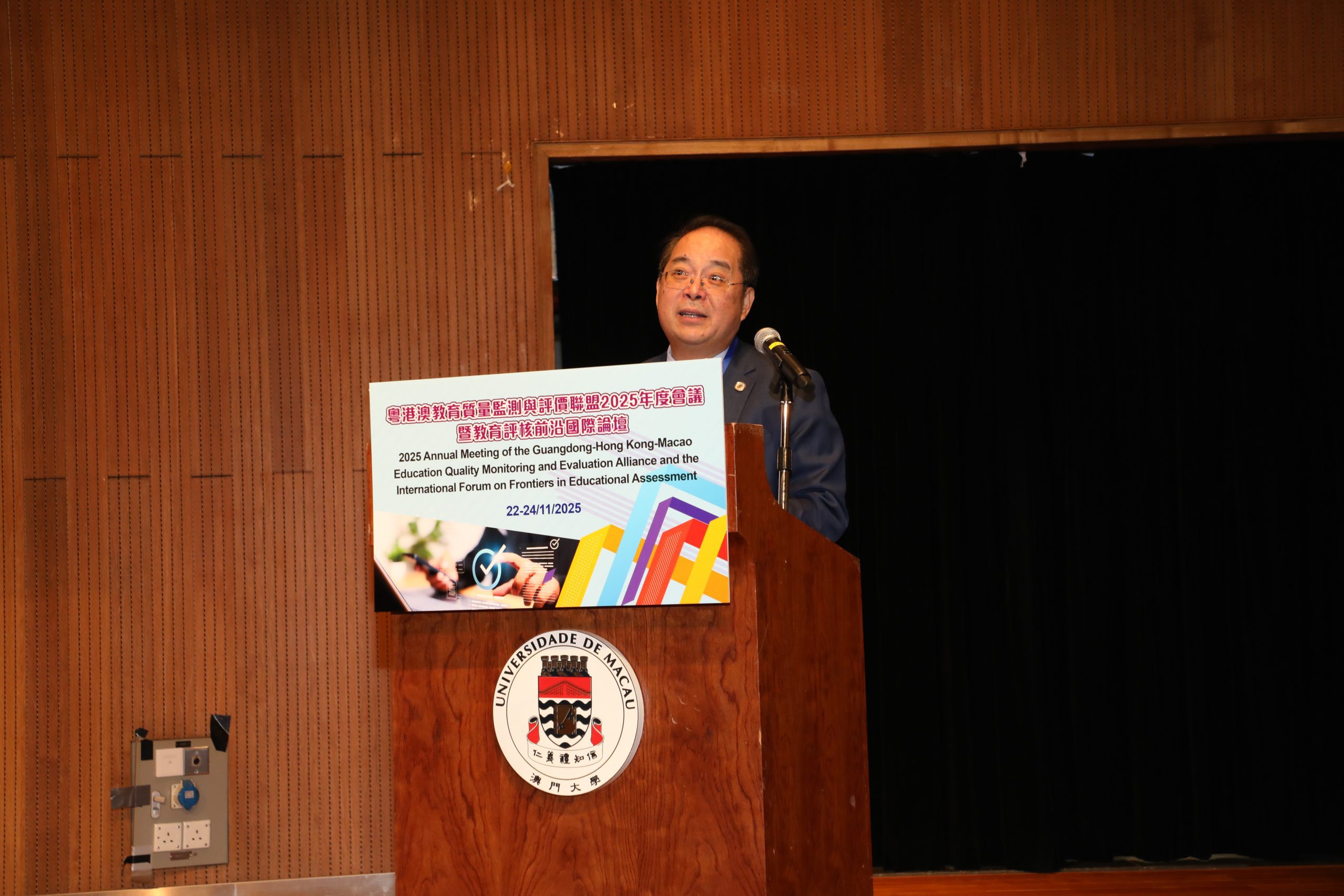 |
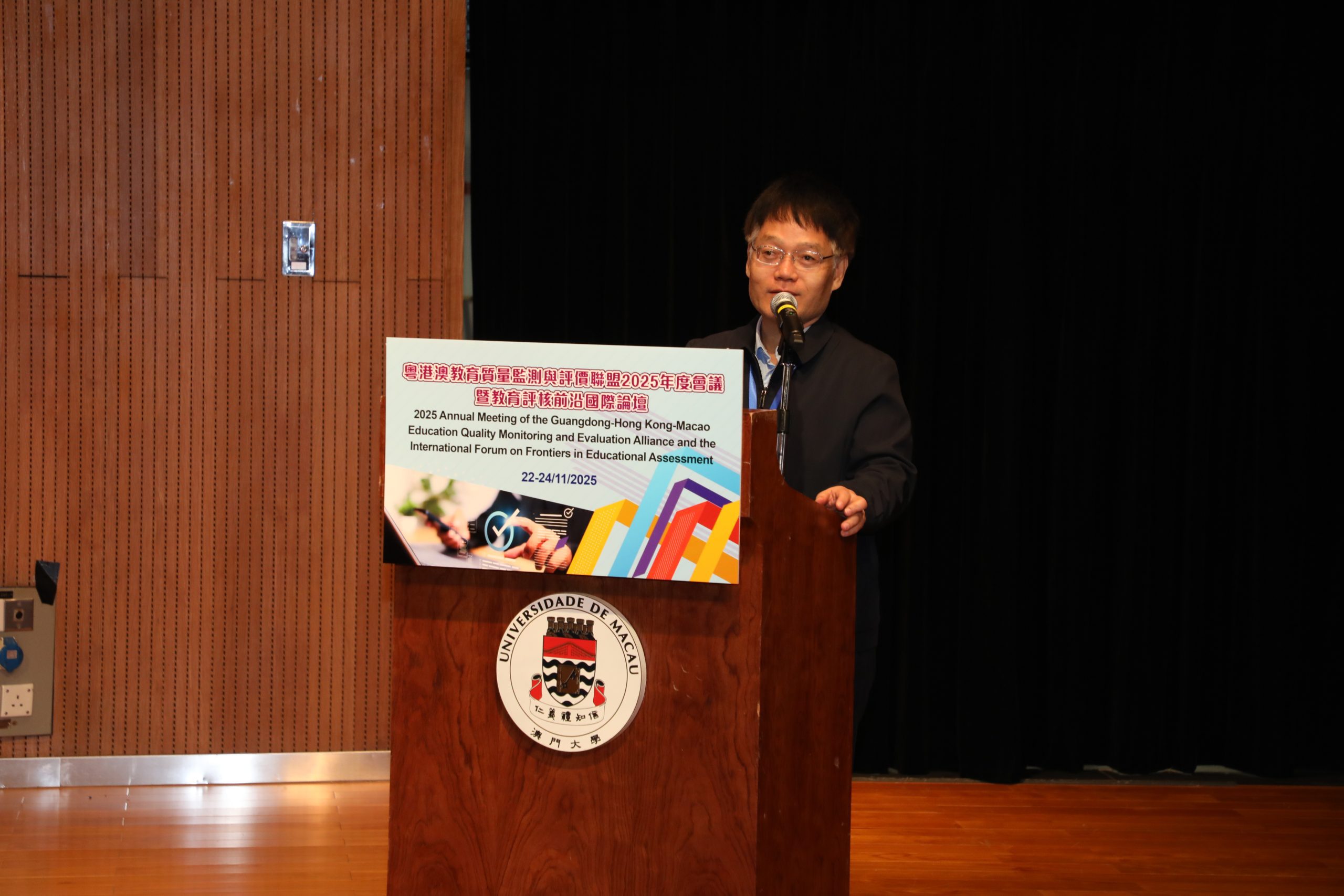   |
| Prof. Lianghuo FAN | Prof. Tao XIN |
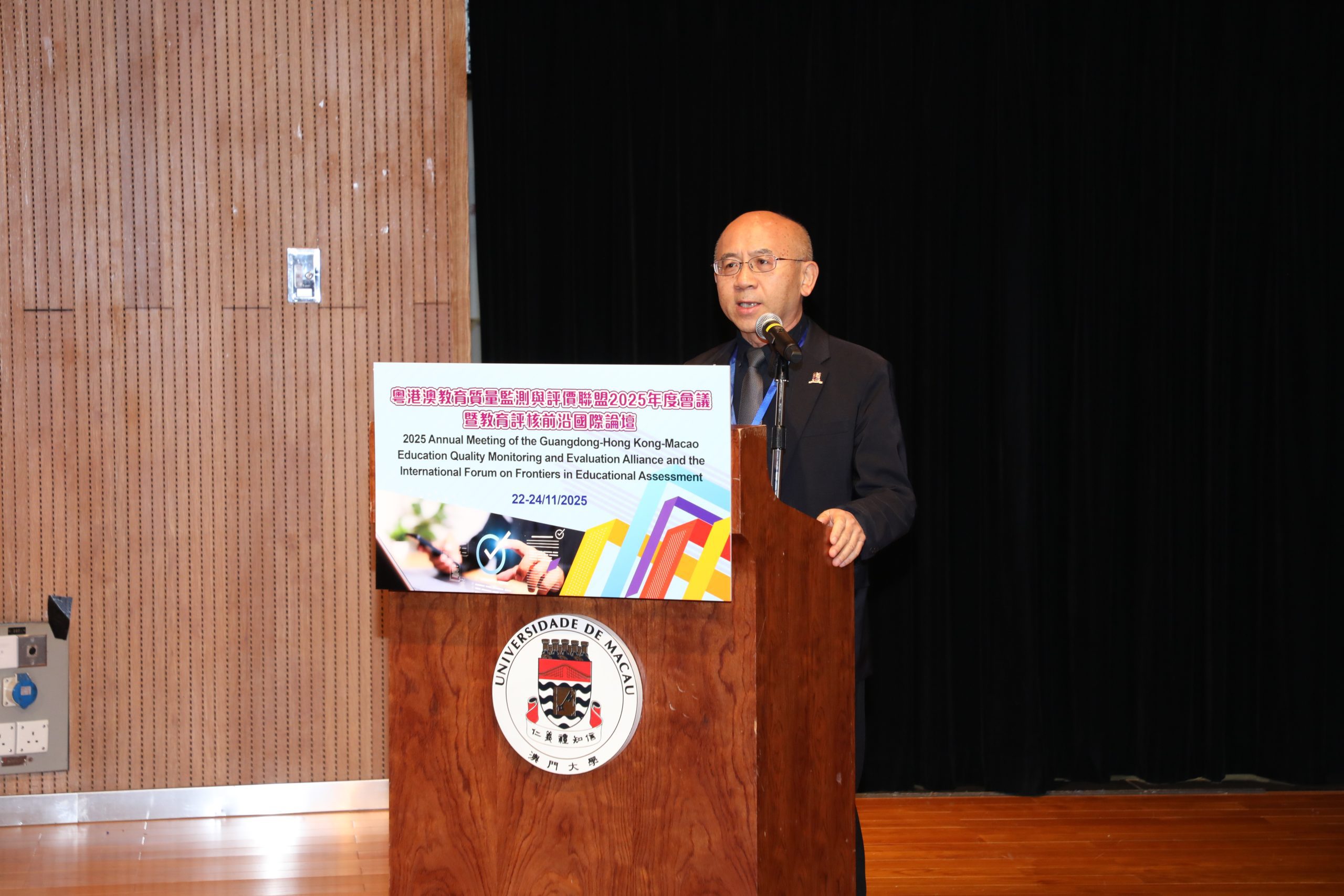   |
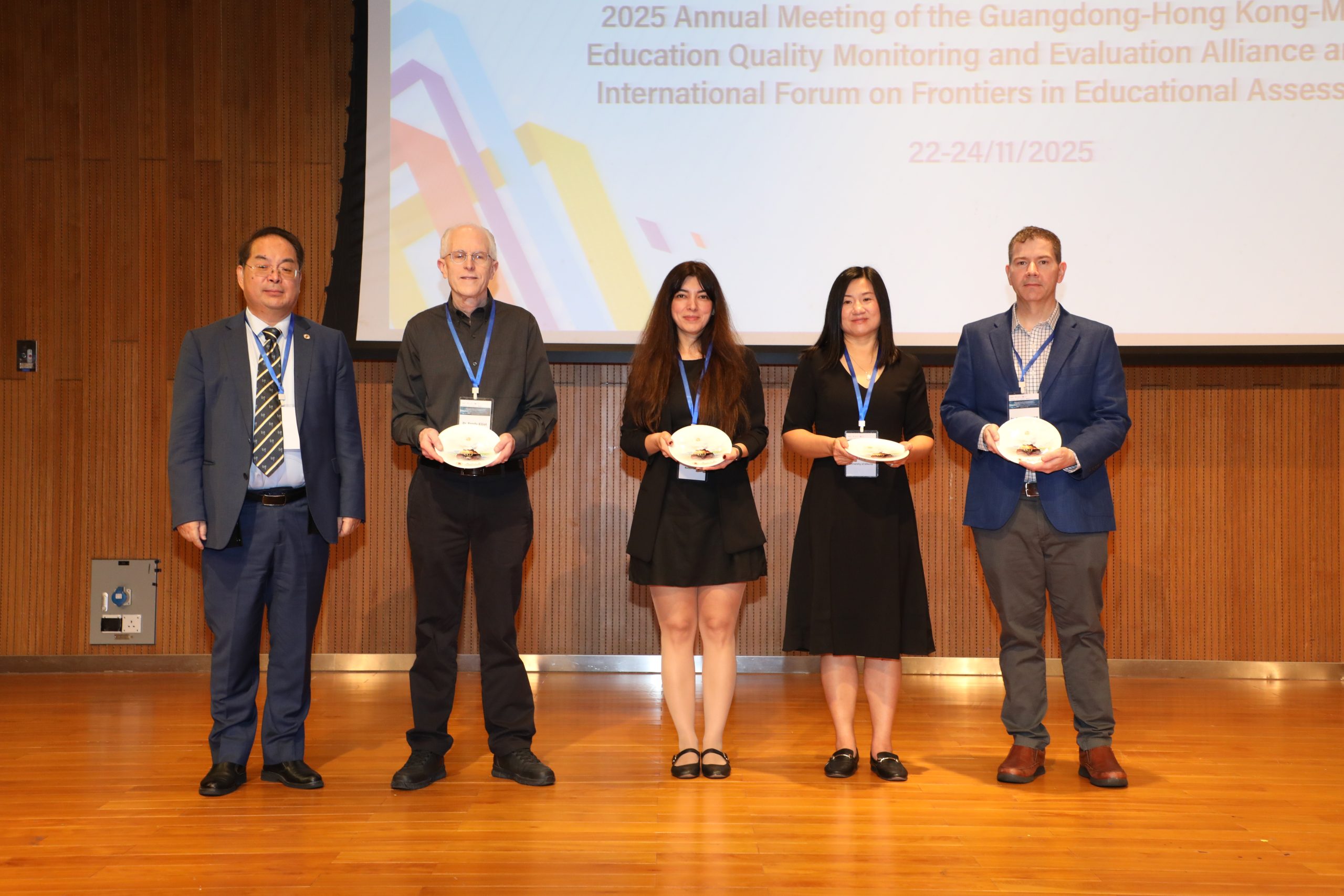   |
| Prof. Xitao FAN | Presented the souvenirs to the keynote speakers |
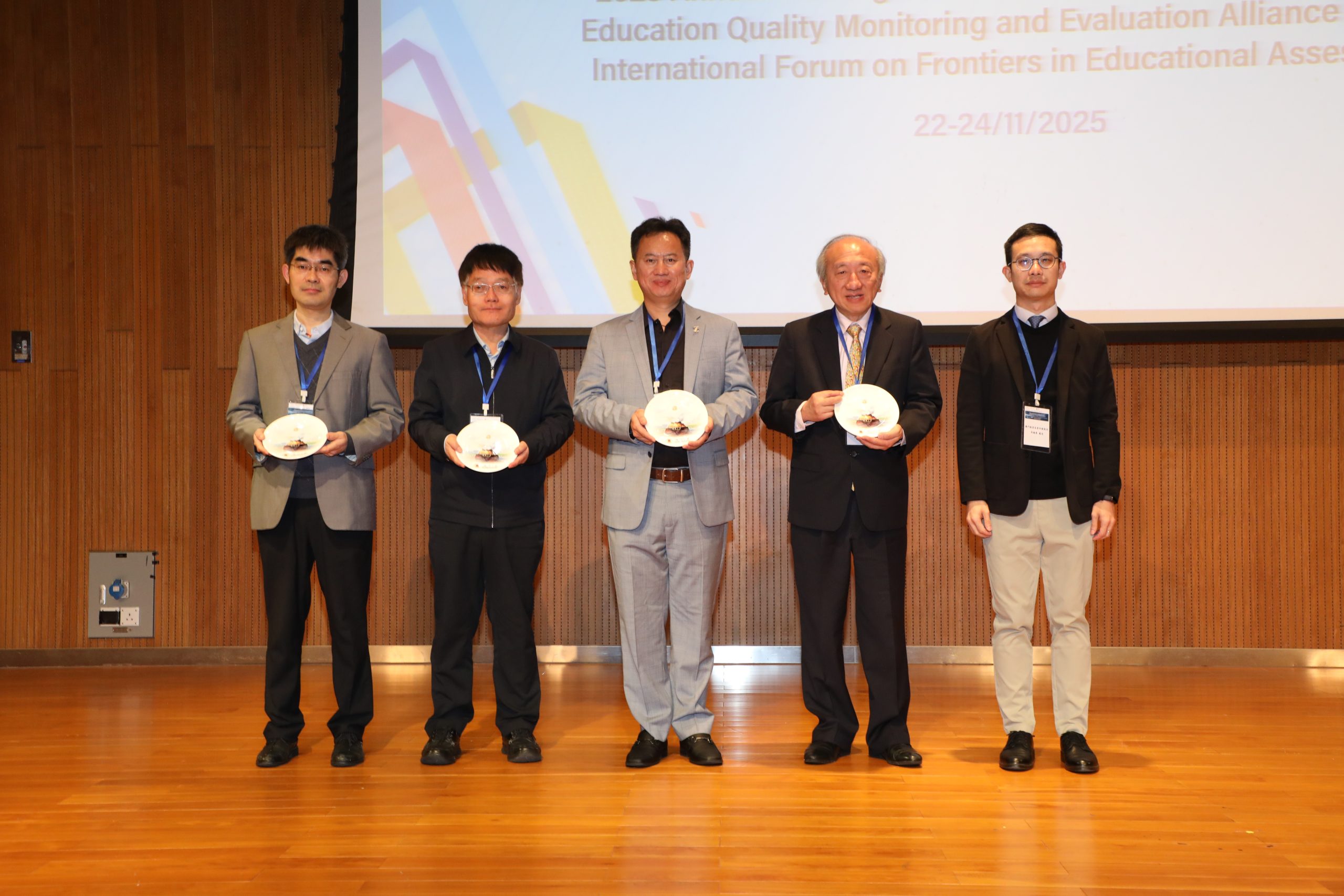   |
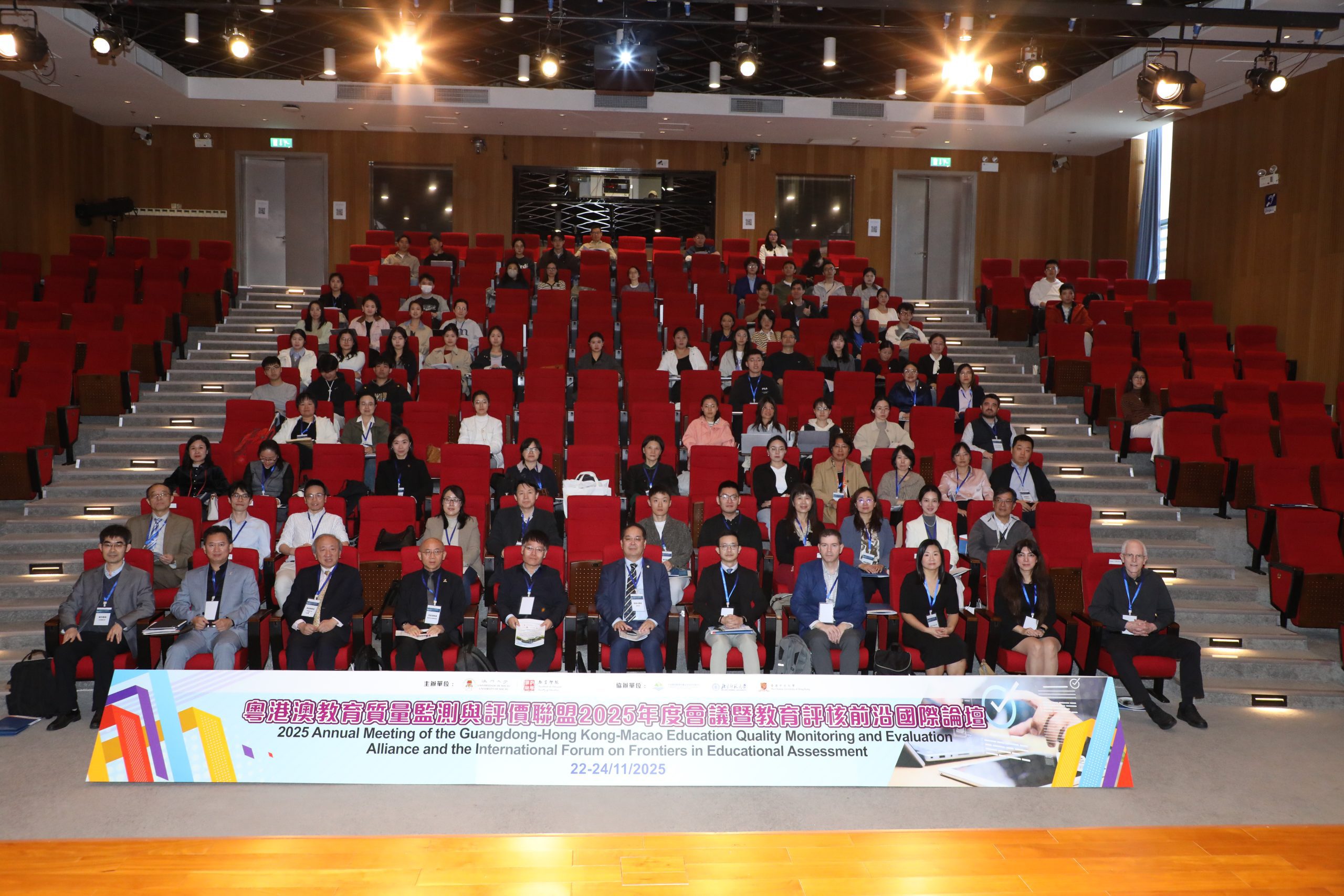   |
| Presented the souvenirs to the keynote speakers | Group photo |
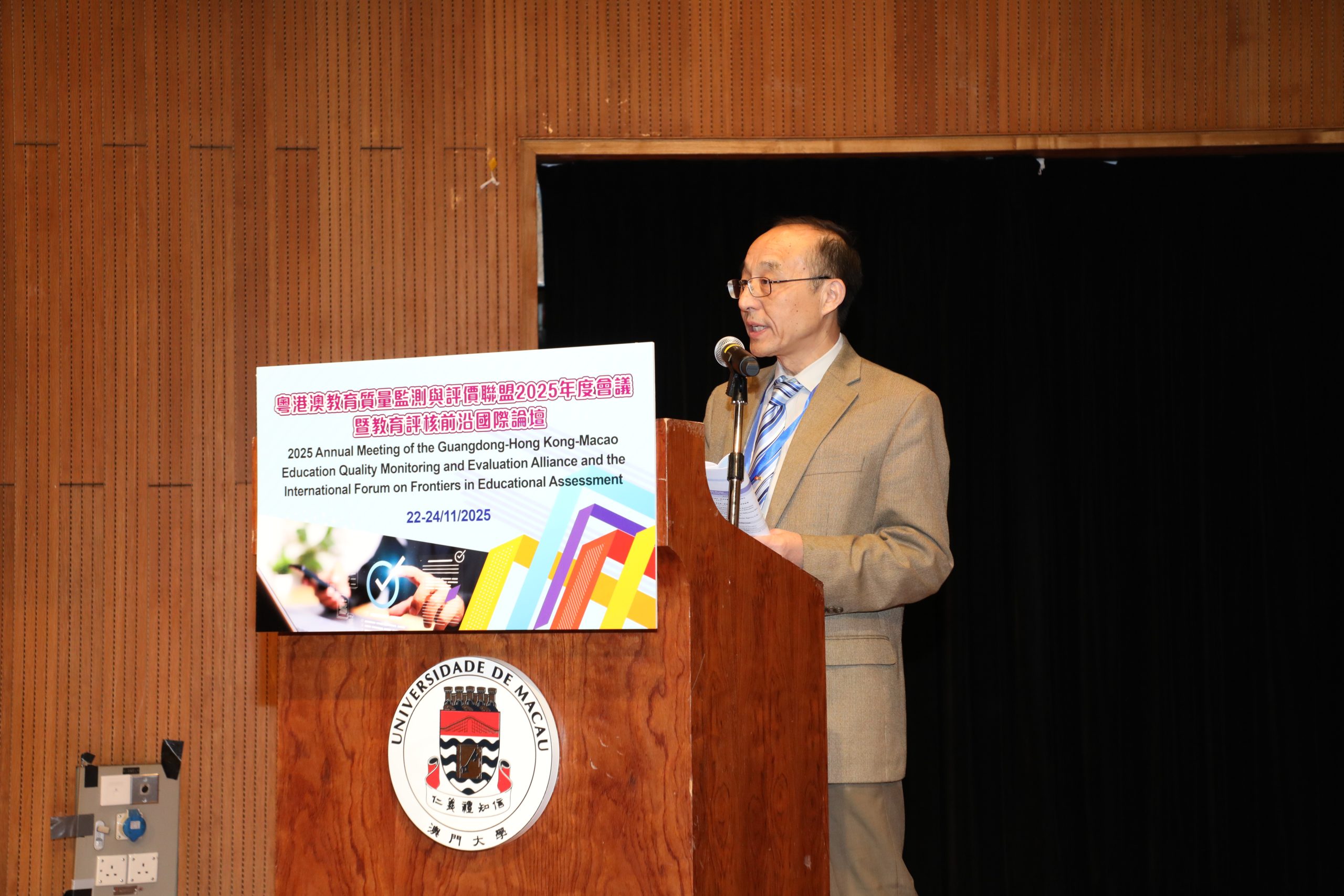   |
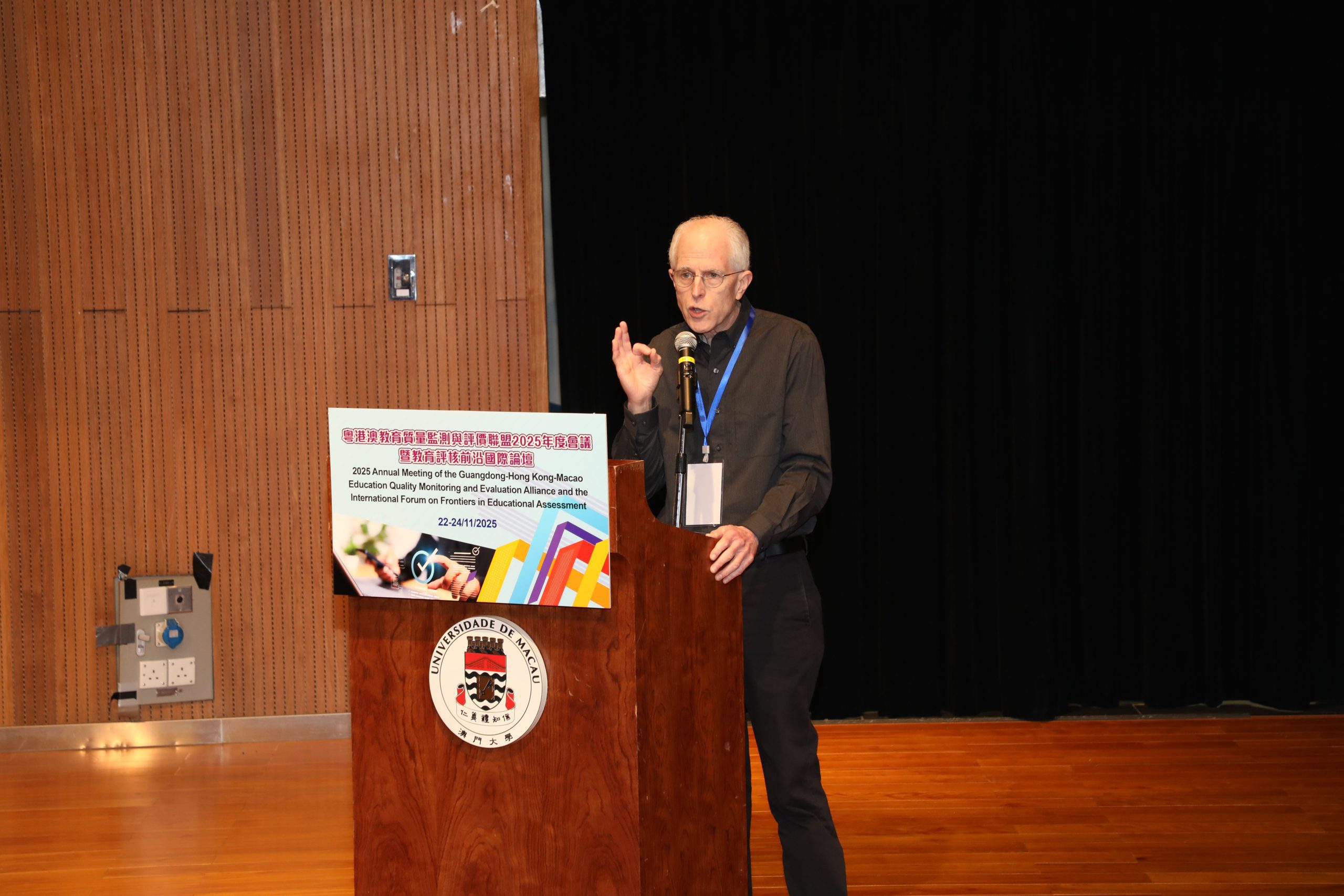   |
| Prof. Xiufeng LIU | Dr. Randy Elliot BENNETT |
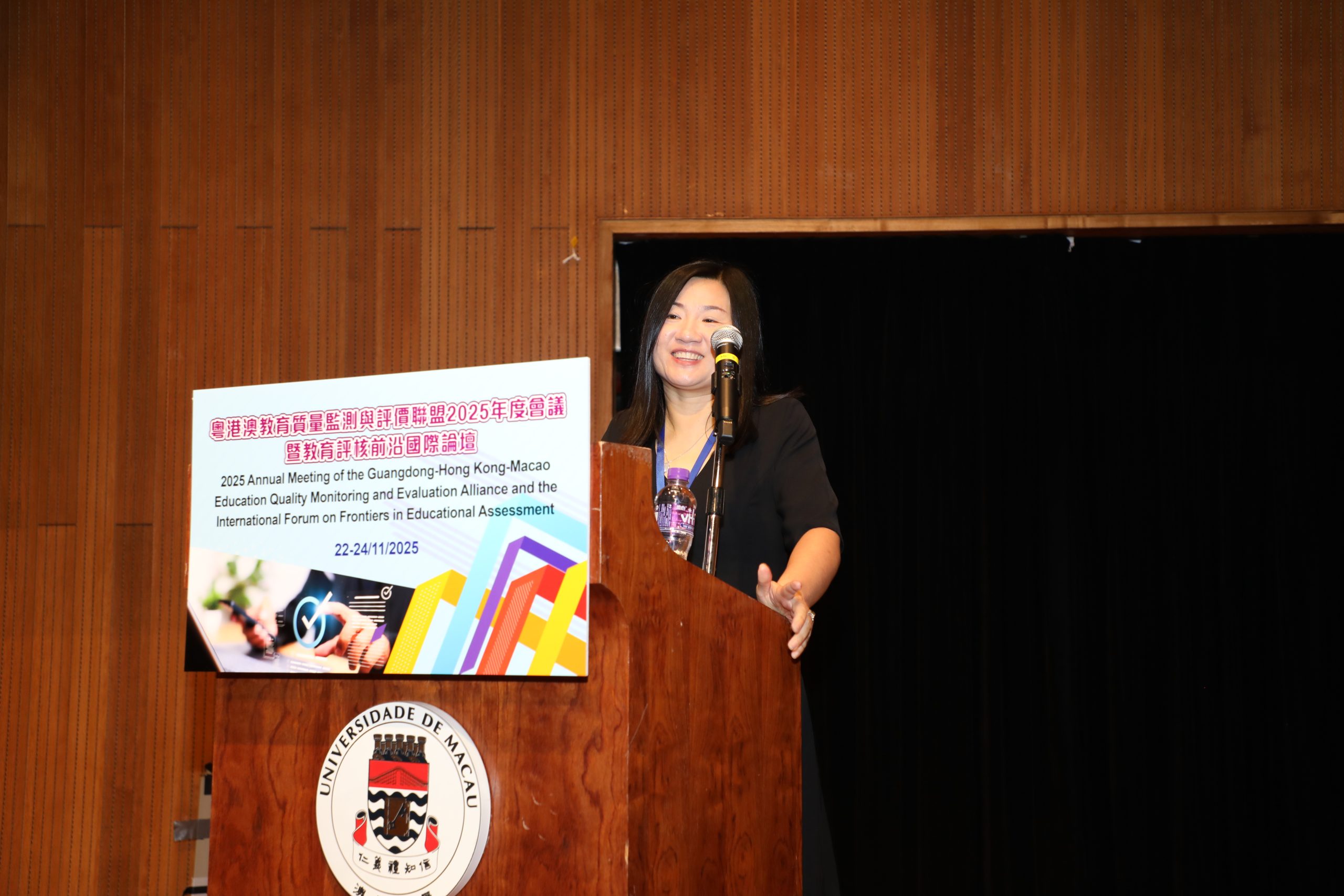   |
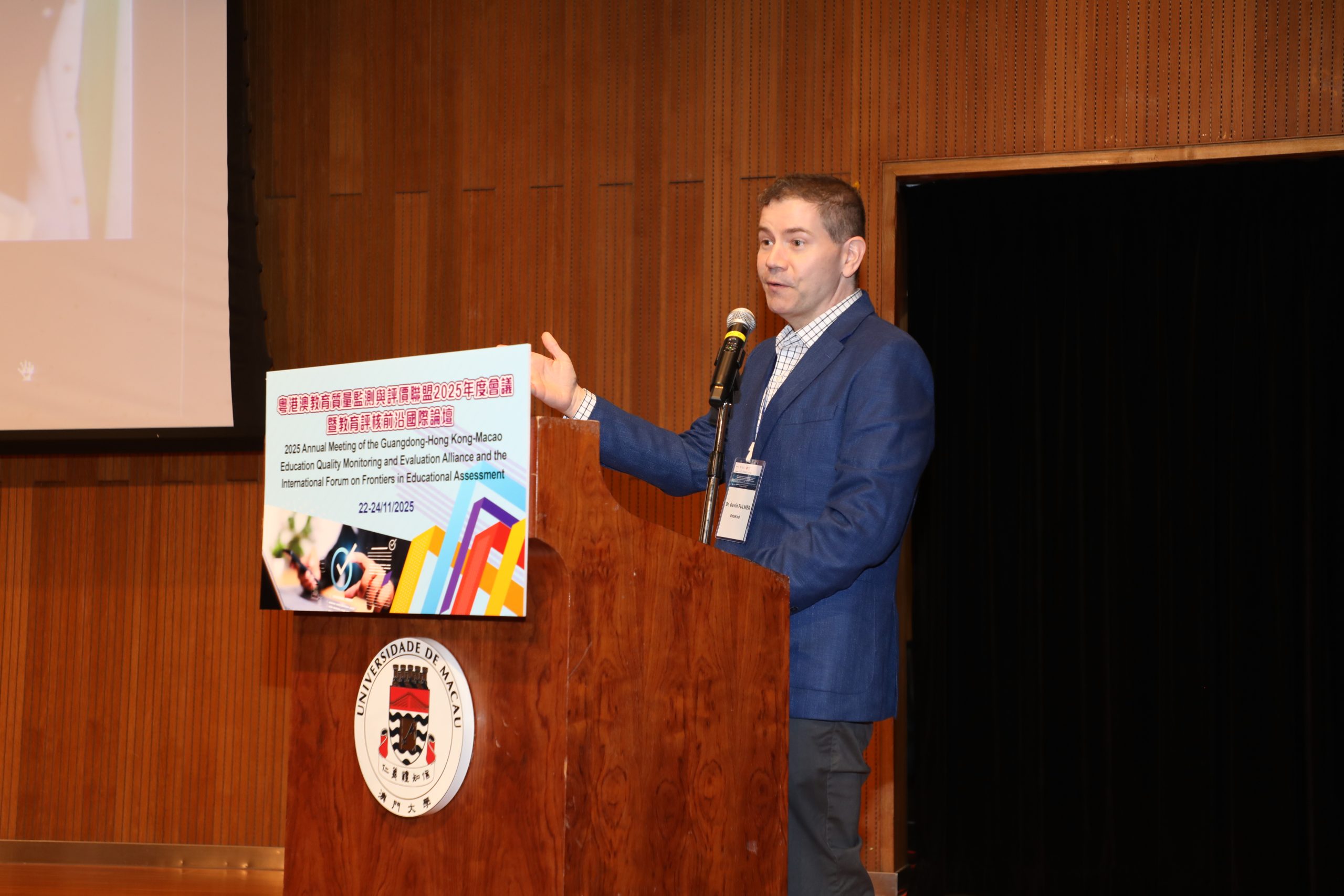   |
| Prof. Ying CUI | Dr. Gavin William FULMER |
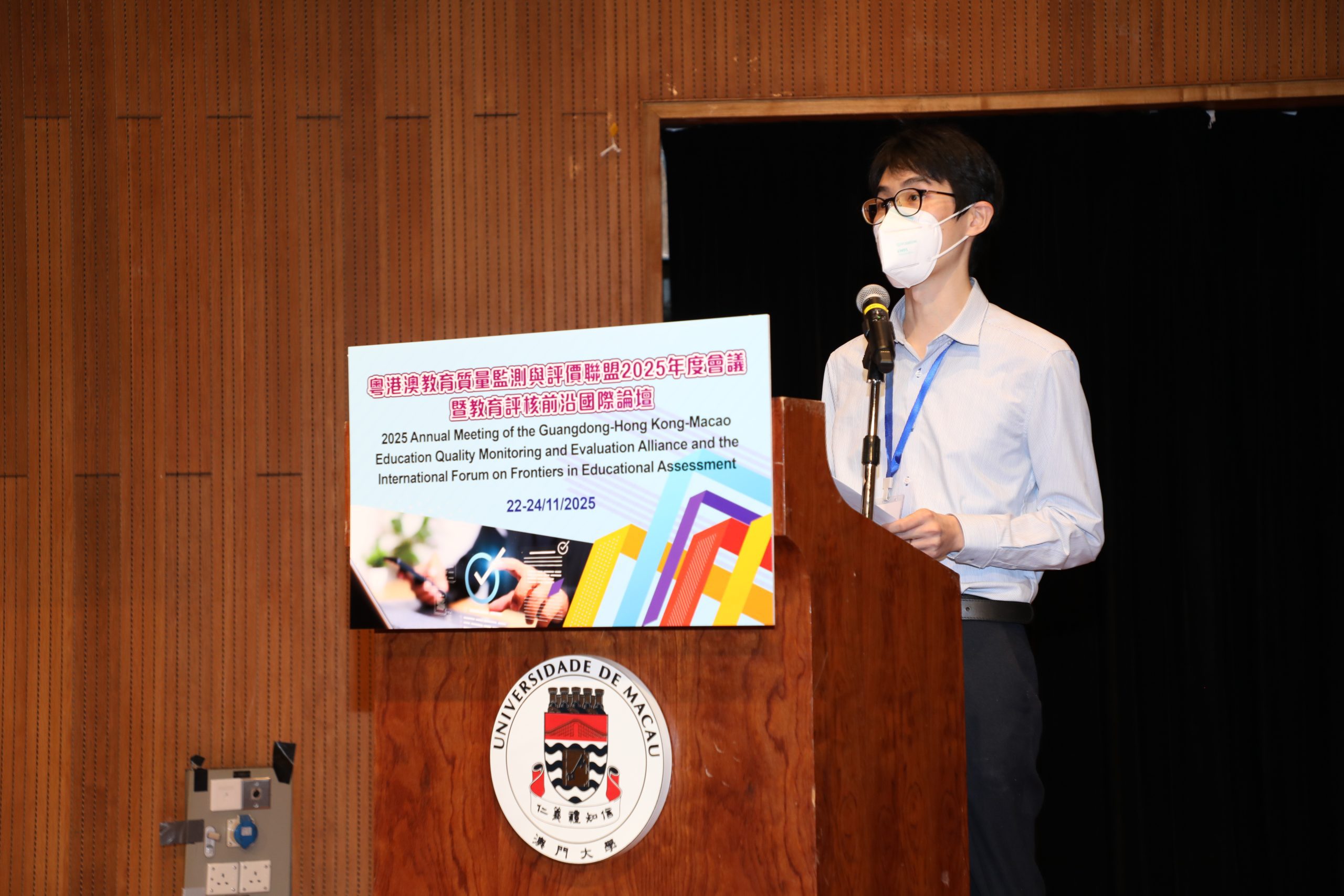   |
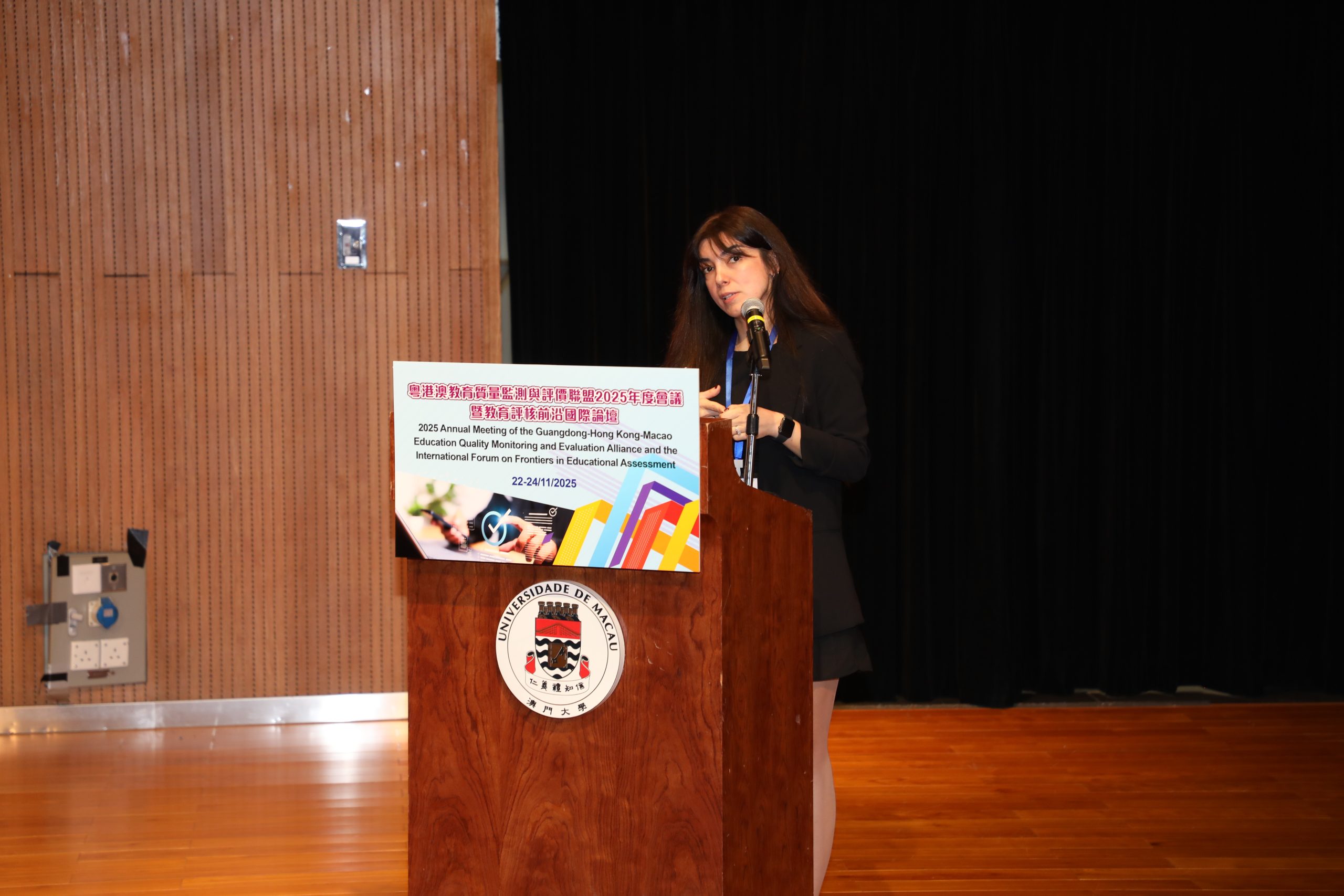   |
| Prof. Hok Chio LAI | Prof. Ummugul BEZIRHAN |
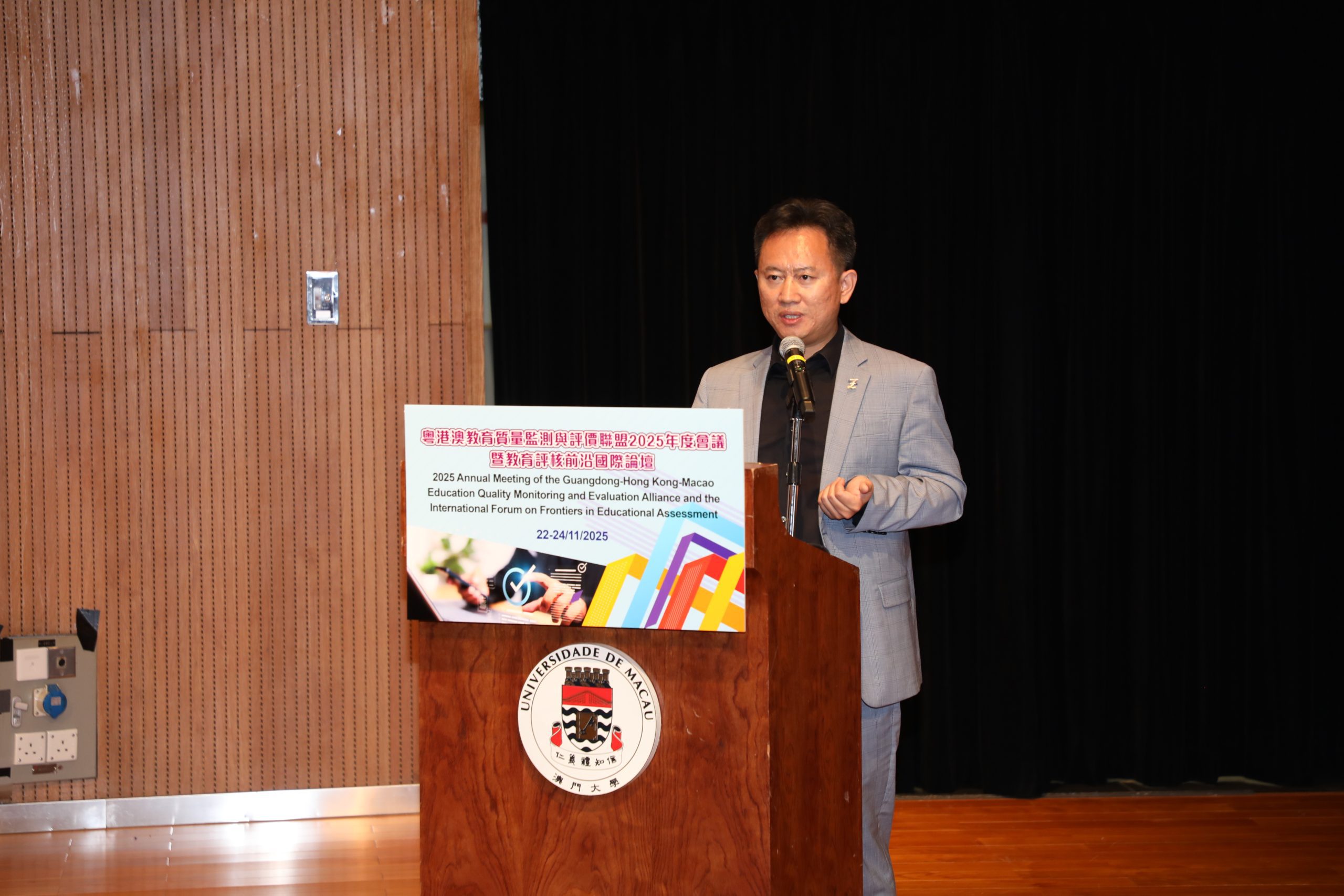   |
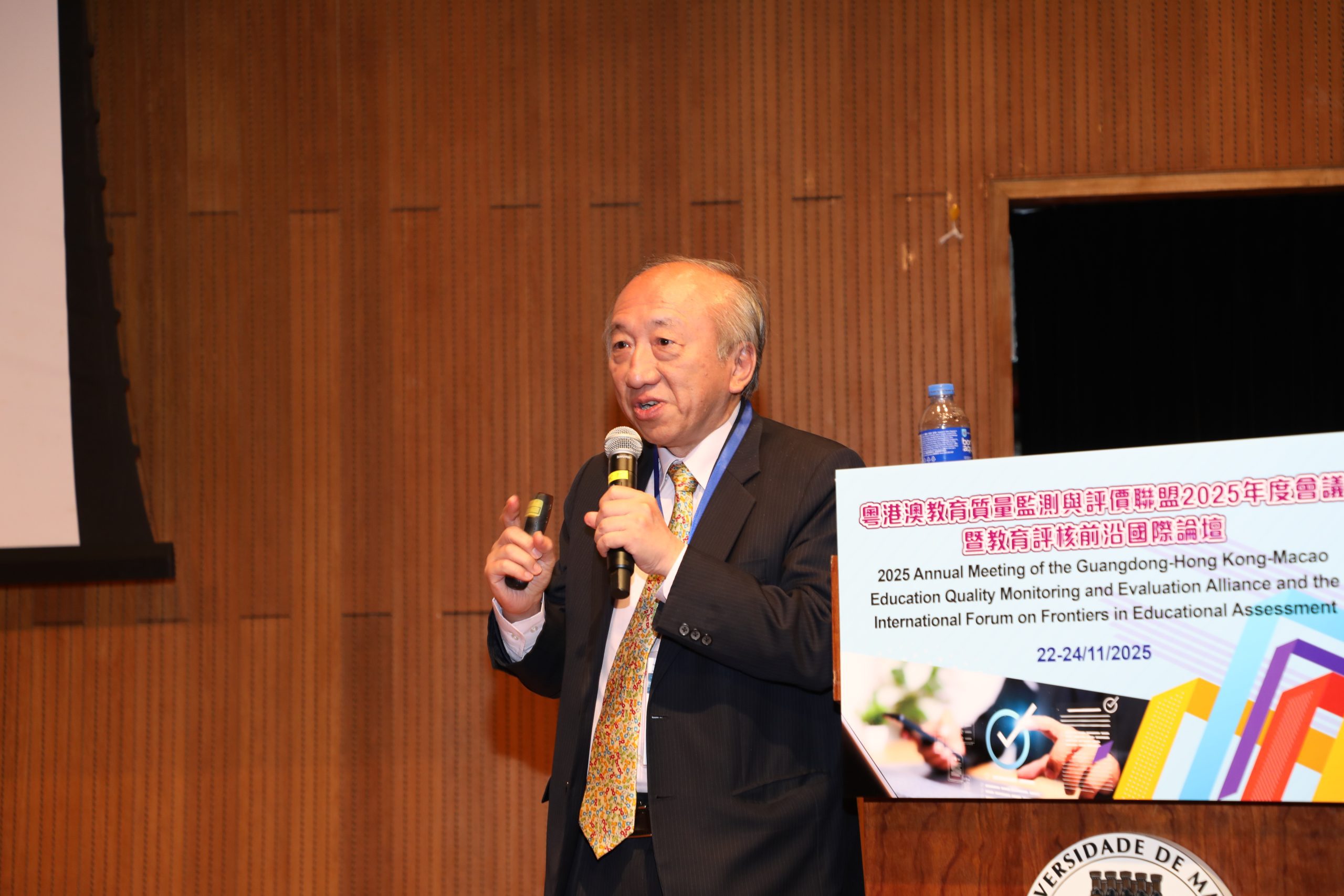   |
| Prof. Xiaoming ZHAI | Prof. Kit-tai HAU |
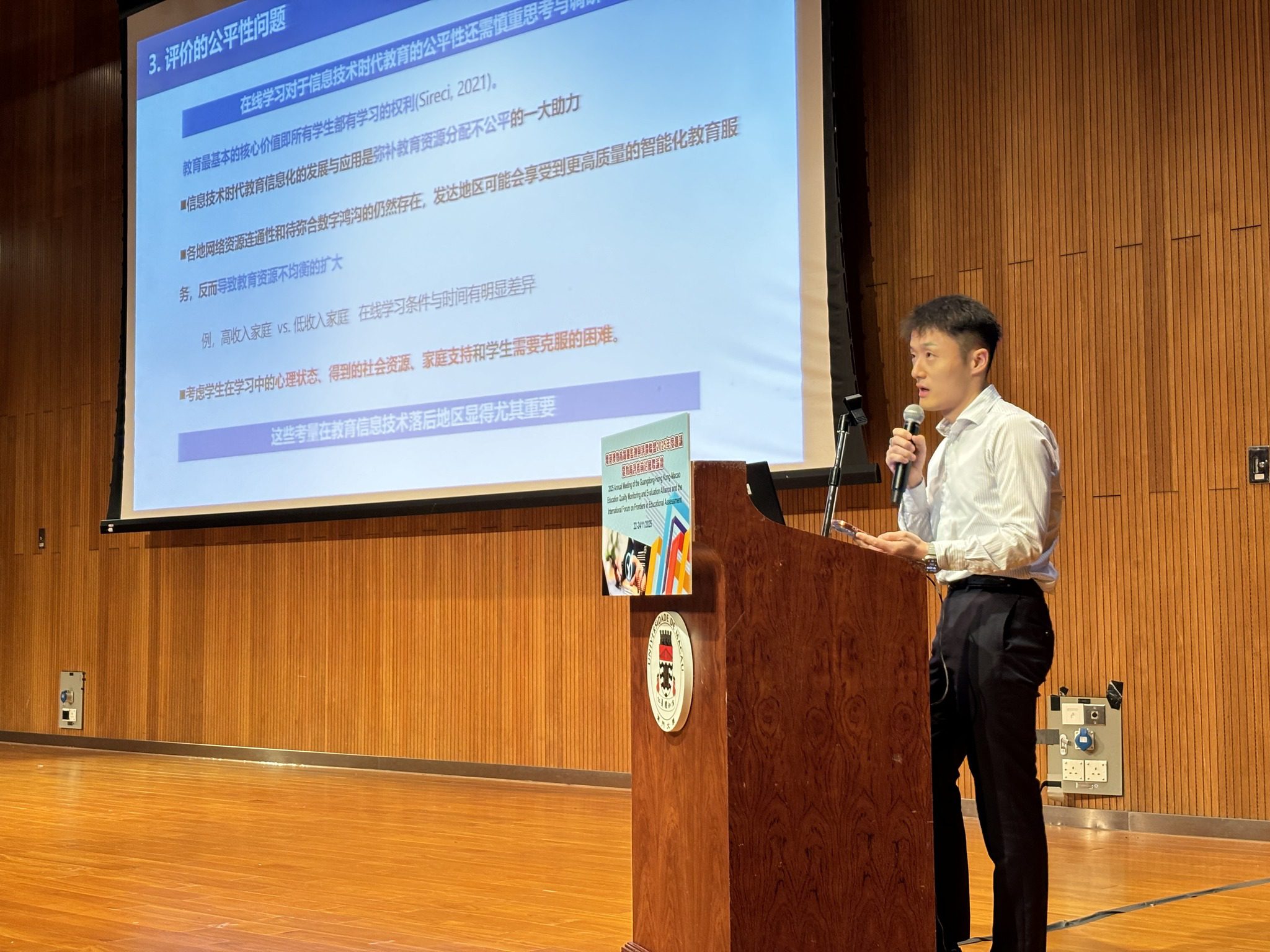   |
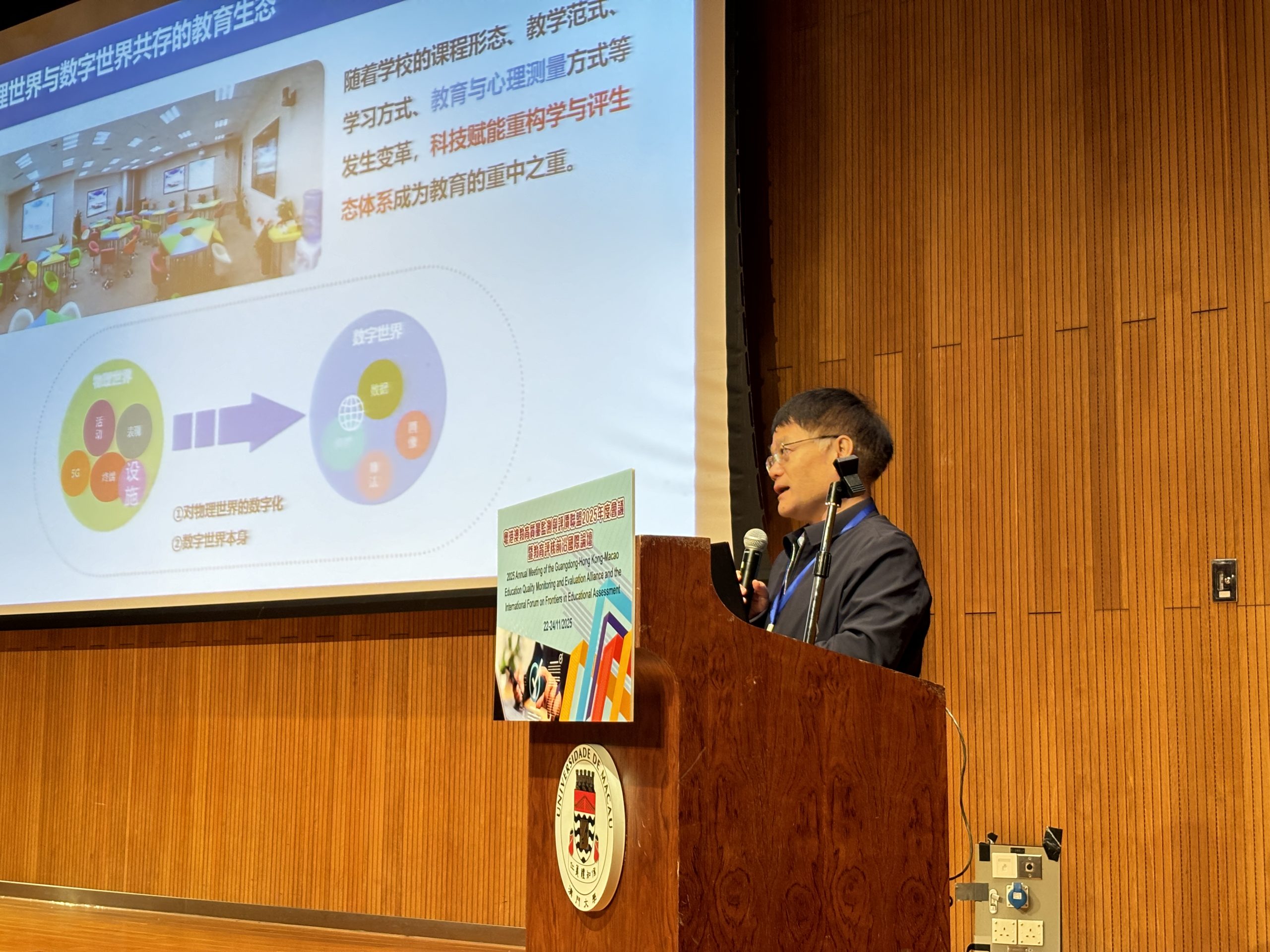   |
| Prof. Fu CHEN | Prof. Tao XIN |
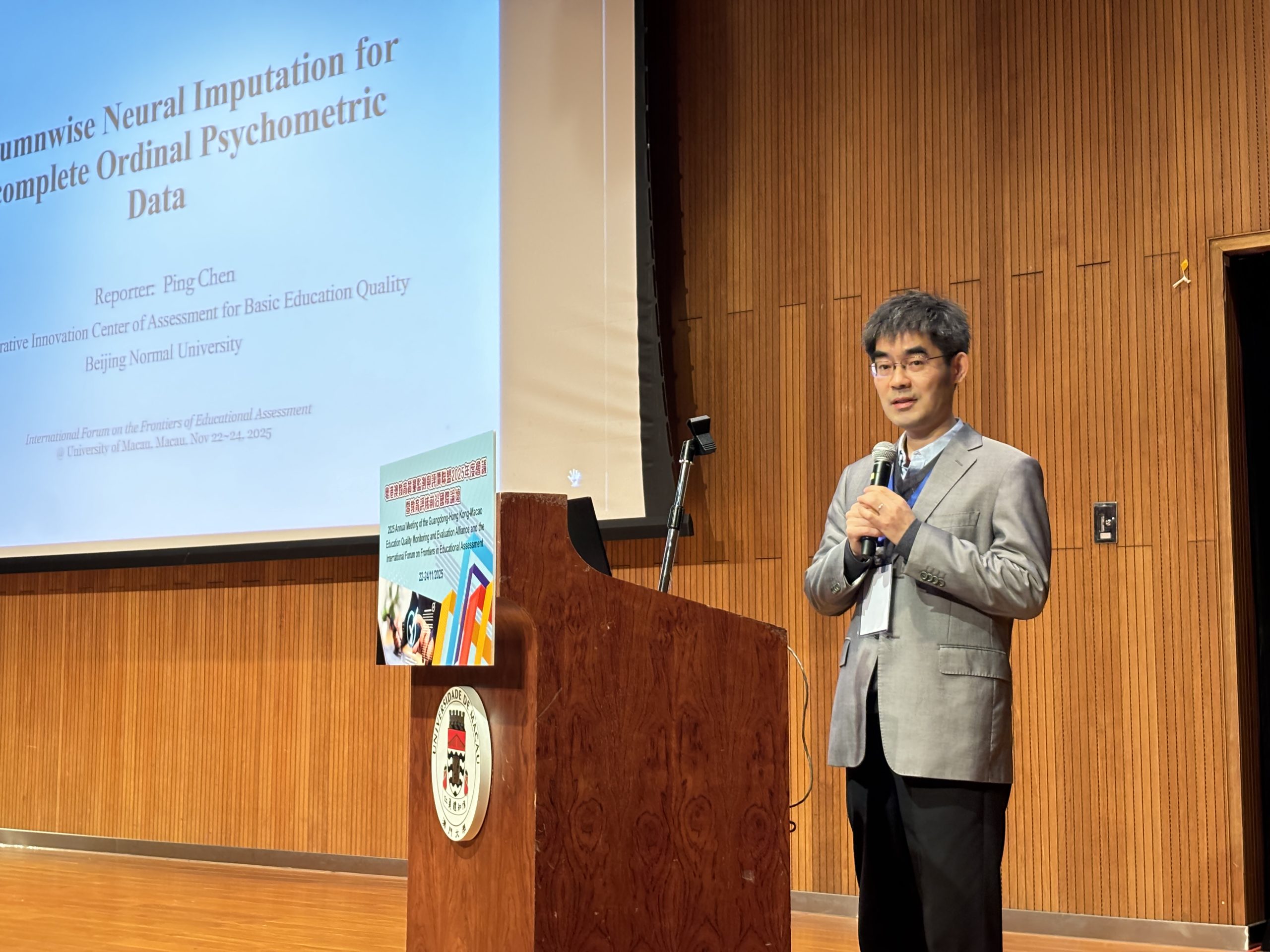   |
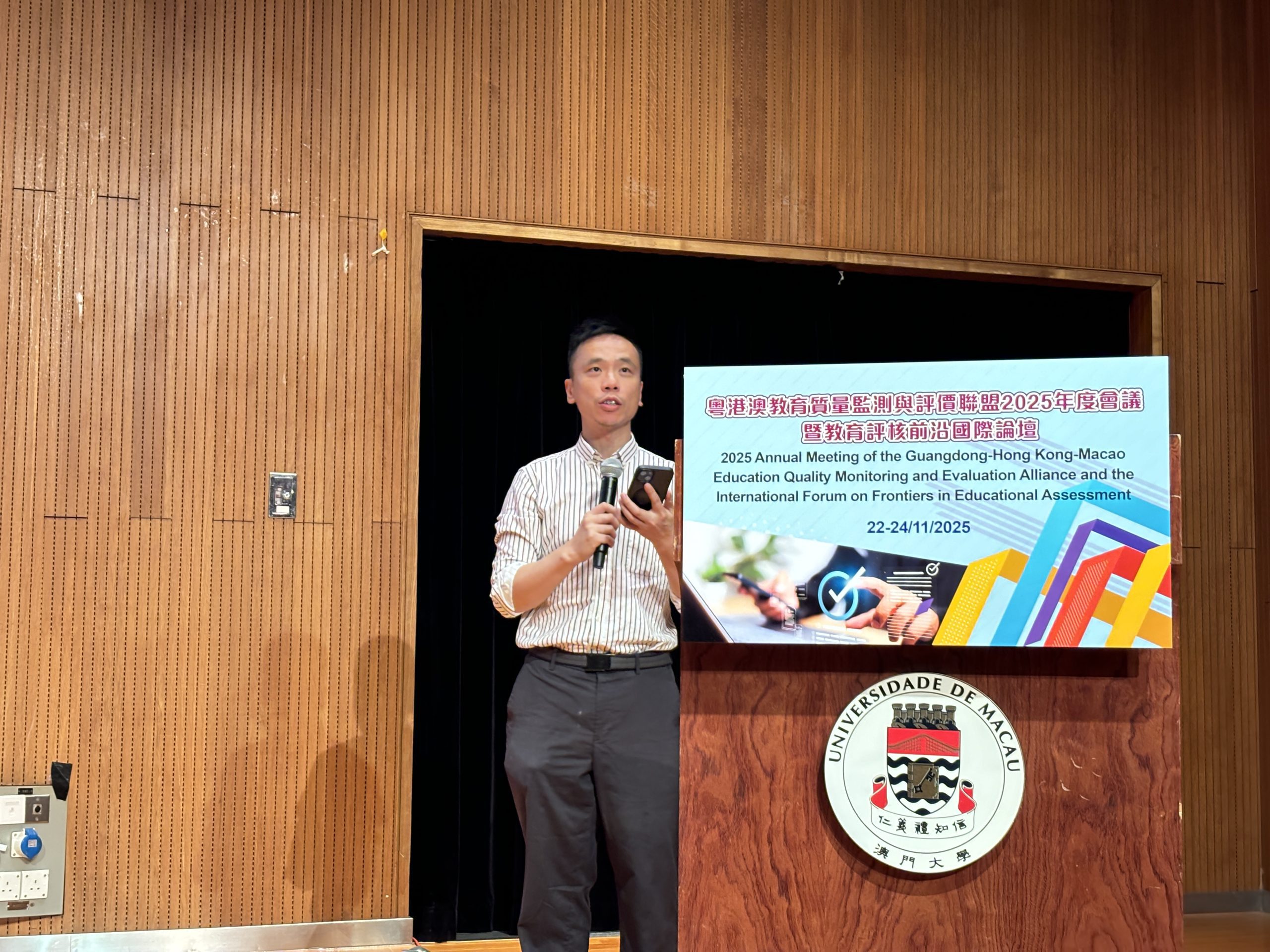   |
| Prof. Ping CHEN | Prof. Chun Seng KAM |
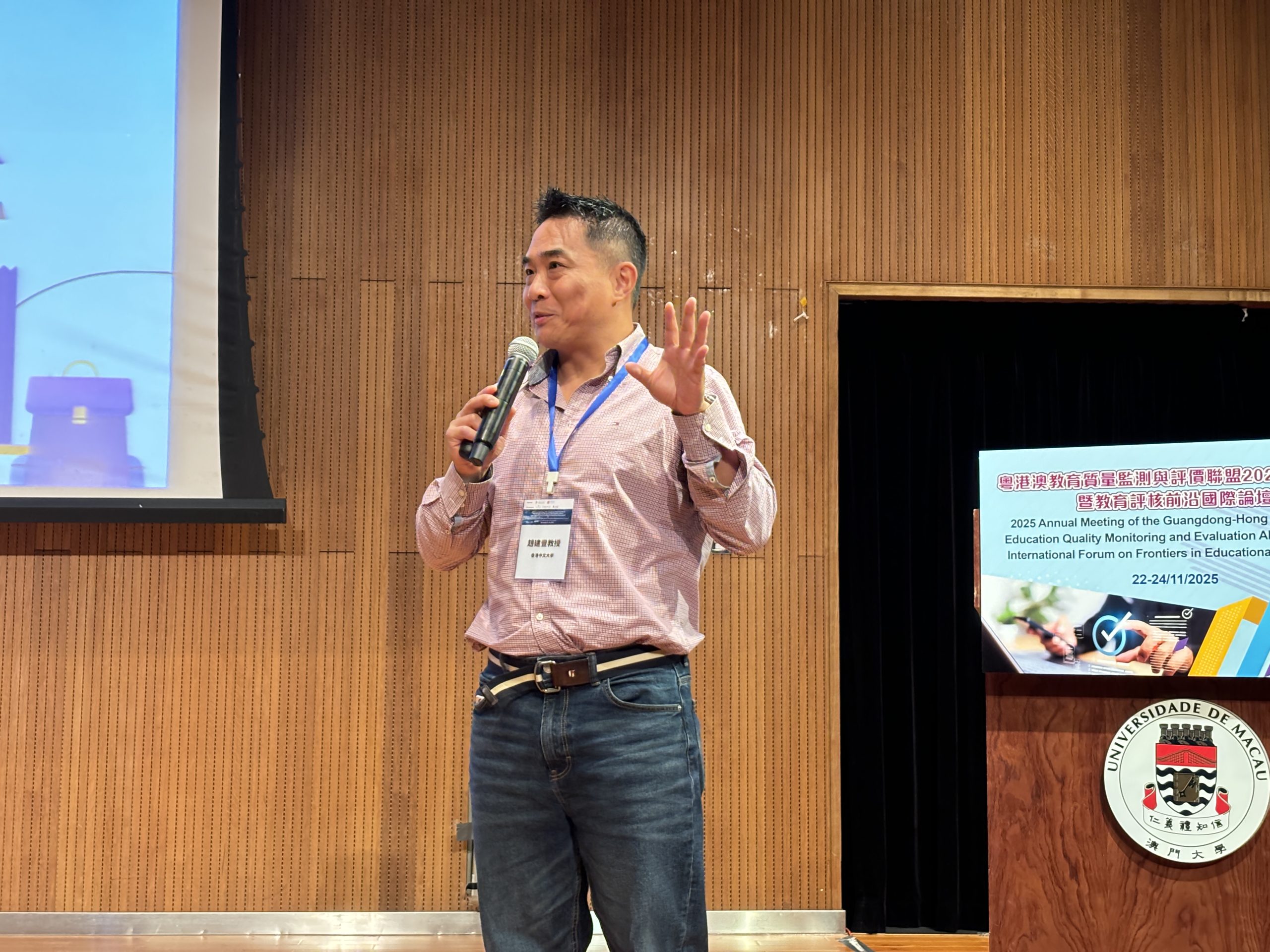   |
|
| Prof. Thomas Kin-fung CHIU | Prof. Weicong LYU |
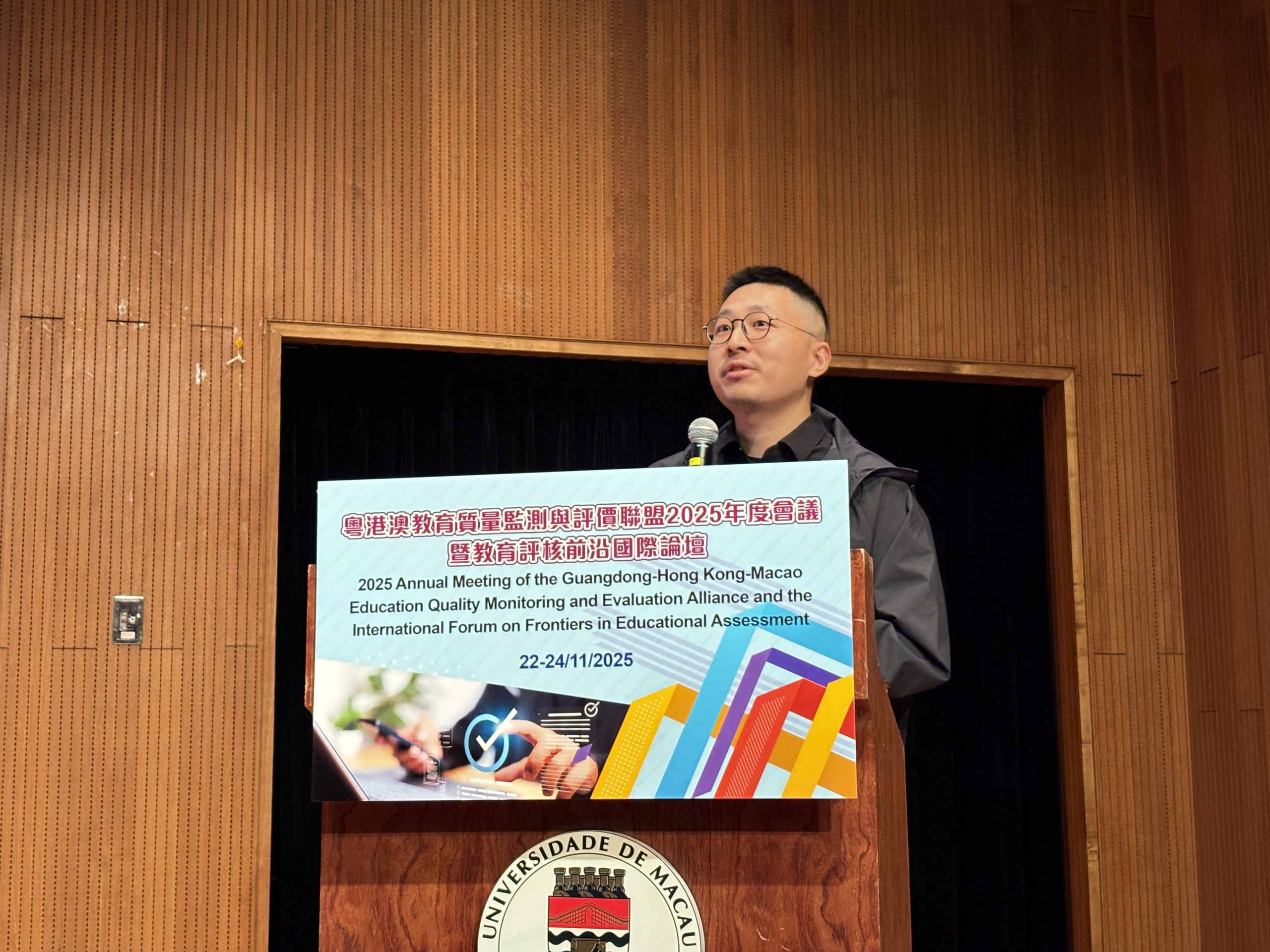   |
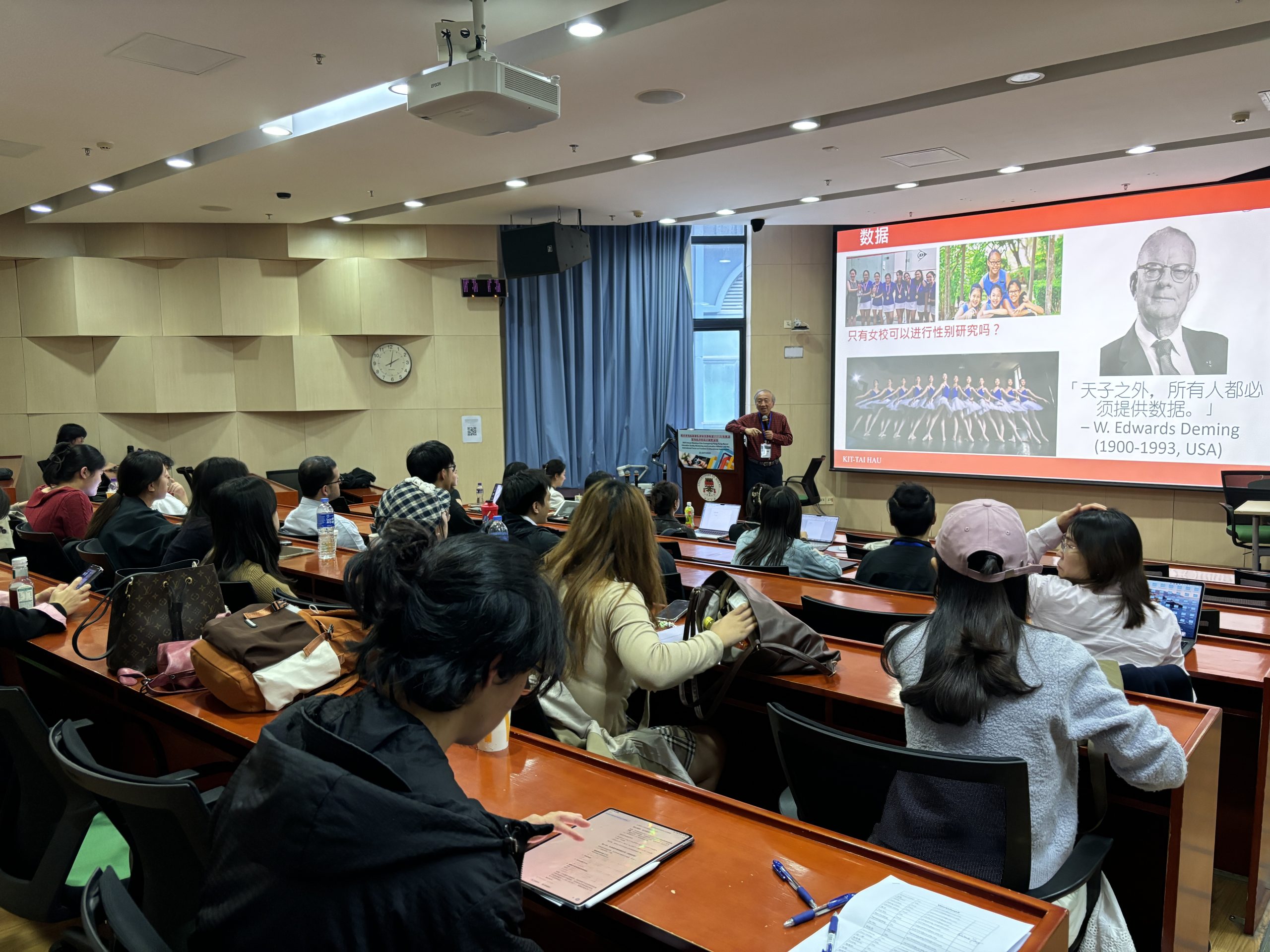   |
| Prof. Lele SHA | Concurrent session |
Thank you for your kind attention.
Faculty of Education
為響應 “教育強國” 及 “粵港澳大灣區建設” 等國家重大戰略需求,由澳門大學教育學院主辦,北京師範大學中國基礎教育質量監測協同創新中心及香港中文大學教育學院協辦的 “2025年粵港澳教育質量監測與評估聯盟年度會議暨教育評估前沿國際論壇” 於2025年11月22至24日在澳門大學教育學院順利舉行。本屆論壇聚焦新興教育評估理論與方法; 教育評估中的技術應用; 大規模評估的設計與實施; 新興能力評估及教育質量監測與評估的政策等議題,吸引粵港澳及海內外多地學者參與。
是次論壇是粵港澳教育質量監測與評價聯盟的第三屆年會,澳門大學教育學院院長兼科技與人工智能教育中心主任范良火教授在開幕致詞中指出,人工智能正重塑教育評估的工具與方法,而粵港澳三地在教育及科研上的互補優勢,使本次論壇成為促進合作的重要平台。北京師範大學中國基礎教育質量監測協同創新中心主任辛濤教授與香港中文大學教育學院院長范息濤教授亦在致詞中肯定三地於教育質量監測與評估領域的合作成果,並指出在面對教育轉型與科技加速發展的當下,加強區域協同、深化跨地域研究、推動方法創新,是提升教育品質與促進學生全面發展的重要方向。
會議期間共舉行了十一場主題演講,內容精彩紛呈。來自美國教育測驗服務社(ETS)的Bennett博士介紹跨年度連續性評量、遠端測驗與人工智能的最新發展,強調評量的效度與公平性仍不可動搖。加拿大阿爾伯塔大學Ying CUI教授分享以人工智能對話代理進行批判思維評量的方法,透過分析學生語言互動呈現更貼近真實的推理歷程。美國DataKind的Gavin William FULMER博士則展示一套運用人工智能支援大學STEM領域學生的預警與支持系統。美國波士頓學院Ummugul BEZIRHAN教授介紹人工智能在國際數學與科學教育成就趨勢研究(TIMSS)與國際學生閱讀素養進展研究(PIRLS)中的應用,包括自動題目生成、評分與屬性分類等技術的實際推展。美國喬治亞大學翟小銘教授從科學教育角度探討人工智能評量的機會與挑戰,指出需審慎處理技術可能帶來的偏差。香港中文大學侯傑泰教授則以非認知能力測量為例,說明跨文化比較中易受反應風格影響,建議以變項關係分析取代平均數比較,以提升研究的政策意義。
此外,北京師範大學辛濤教授闡述 “學評融合” 理念從選拔導向轉向促進學習的實踐轉變;陳平教授介紹COLumnwise神經插補(COLNI)算法,用以有效處理心理測量數據中的順序缺失值。香港中文大學趙建豐教授探討人工智能在自動化評分與複雜能力測量中的角色,強調未來評量將由教師、學生與人工智能協同運作。澳門大學呂偉聰教授講解正則化方法在差異試題功能檢測及試題反應理論中的應用;沙樂樂教授則以法律寫作與學習分析為例,展示人工智能在即時學習回饋中的顯著成效。
會議同期舉辦 “生成式人工智能在教育評估中的應用與大型國際評估資料採擷” 專題工作坊,由澳門大學陳孚教授、Randy E. BENNETT博士、香港中文大學侯傑泰教授及澳門大學郭露陽教授主講,涵蓋機器學習在資料處理與模型建構、生成式人工智能於試題開發、大規模數據解讀教育系統運作,以及跨地域比較的文化與作答差異等議題,並安排實操訓練,深受與會者好評。
大會另設多場分組報告,議題涵蓋人工智能輔助數學補救教學、學生作答行為分析、跨文化科學素養研究、教育政策影響等,報告人來自內地、香港、澳門及海外多所高校,討論熱烈,充分展現年輕學者在教育評估領域的活躍與潛力。
本屆論壇內容兼具學術深度與實務廣度,展現粵港澳三地在教育質量監測與評估領域的協同成果,也為未來的區域合作與研究創新奠定扎實基礎。
   |
   |
| 范良火教授 | 辛濤教授 |
   |
   |
| 范息濤教授 | 致送紀念品予主講嘉賓 |
   |
   |
| 致送紀念品予主講嘉賓 | 大合照 |
   |
   |
| 柳秀峰教授 | Randy Elliot BENNETT博士 |
   |
   |
| Ying CUI教授 | Gavin William FULMER博士 |
   |
   |
| 黎學昭教授 | Ummugul BEZIRHAN教授 |
   |
   |
| 翟小銘教授 | 侯傑泰教授 |
   |
   |
| 陳孚教授 | 辛濤教授 |
   |
   |
| 陳平教授 | 甘俊生教授 |
   |
|
| 趙建豐教授 | 呂偉聰教授 |
   |
   |
| 沙樂樂教授 | 分會場情況 |
教育學院 謹啟